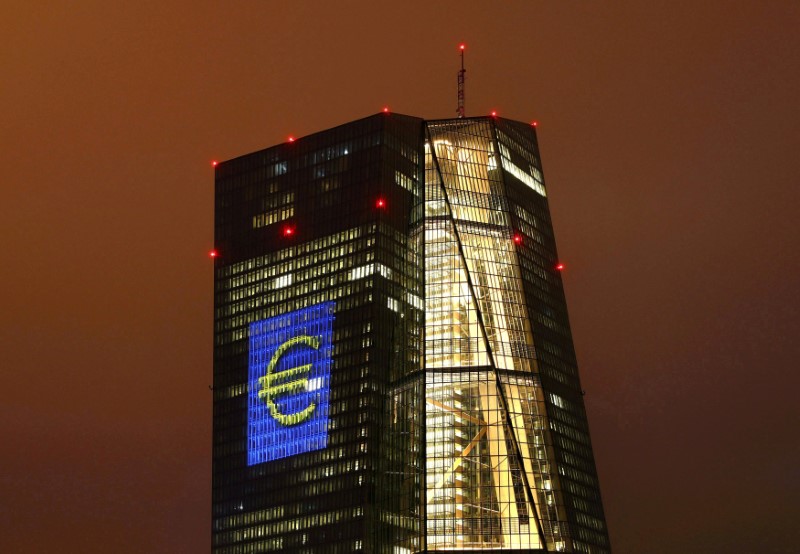By Danilo Masoni
MILAN (Reuters) - The surging euro has played spoilsport with what had become global investors' top trade this year -- buying European equities - though for some recent weakness in stocks offers a chance to reshuffle portfolios and stay invested.
Fund managers, betting on diminishing political risk and confidence that the region was leaving behind years of economic sluggishness and flat-lining corporate profits, pumped money in the first five months of this year into cheaply valued stocks, particularly those that stood to benefit from a global recovery.
However, major stock indexes peaked at two-year highs in May and have suffered sell-offs through the summer as the euro kept rising, fuelling worries that profits at the region's large exporters would suffer as their competitiveness takes a hit.
In August European equity funds even suffered their first weekly outflows in many months, as the euro strengthened to levels that caught many by surprise.
But some of the world's top funds say the falls are overdone and the euro's strength underscores the region's better prospects, so that shares of domestically focused companies could offer rich rewards.
"I used to own a lot of exporters but that's changed," said Fidelity's Bill Kennedy, who has been managing the $10 billion Fidelity International Discovery Fund since 2004.
Kennedy has already made his bets by adding to his portfolio more banks, builders and materials firms that he reckons will take advantage of a domestic recovery in the region.
"The strengthening euro is a sign of improved confidence... The reality is that interest rates are going up because people are more confident and that's a good thing," he said.
Strength in the euro not only helps many firms reduce costs of imported goods but historically it has lifted returns for offshore investors, such as Kennedy.
Stocks ranging from builder Vinci (PA:SGEF) and carmaker Renault (PA:RENA) in France to German real estate firm Vonovia (DE:VNAn) and Italian retail bank Intesa Sanpaolo (MI:ISP) are among the top picks for analysts and investors.
They make more than 80 percent of their sales in Europe, which is witnessing a string of upgrades to economic forecasts as domestic demand bolsters the recovery. The European Central Bank has lifted its 2017 euro zone GDP growth estimate to 2.2 percent from 1.9 percent previously.
Yet the sudden spikes in the euro have clearly shown their market-moving potential this summer when the scale of overweight Europe rose close to the highest levels ever.
Data from EPFR Global showed redemptions from European stock funds hit six-month highs in the last week of August when the euro peaked above $1.20 for the first time in two and a half years.
Exchange-traded funds tracking the euro zone blue chip index (STOXX50E) were among the hardest hit as two-thirds of all Europe Equity Funds recorded outflows or no flows, EPFR said.
Graphic for Euro story: http://reut.rs/2jqBYkK
VALUATION GAP
Opportunities abound under the surface.
"Despite euro strength and upgrades to GDP forecasts, domestically focused euro area stocks have so far not materially outperformed," Barclays (LON:BARC) strategists led by Dennis Jose said.
Like Fidelity, the British investment house believes that banks and materials are the sectors to bet on and, if the past is any guide, a strong currency is a good omen.
Historically, a strengthening euro has been a crucial component for European outperformance, Barclays wrote.
Following the initial euro-related stress, European stocks showed signs this month they can weather the swings, raising the prospect that the focus could soon turn to company fundamentals.
When ECB President Mario Draghi last week outlined concerns about currency volatility, the euro spiked higher again but European equities largely shrugged off the move.
"I believe the correlation (euro up/European stocks down) is largely emotional and it is bound to vanish," said Alessandro Balsotti, head of asset management at JCI Capital.
One key ingredient that makes the case for investing in Europe is that valuations have become attractive again. On a price/earnings metric, the broader euro zone index (STOXXE) has never been as cheap vis-à-vis Wall Street since 2009.
UBS strategists led by Nick Nelson believe the discount of stocks with large euro zone exposure is even more appealing, while noting that a strong currency in the past has sometimes coincided with decent European earnings growth.
Among their favorite plays they mentioned Dutch bank ING (AS:INGA), French caterer Elior (PA:ELIOR) as well as Vinci and Renault, which all combine high eurozone exposure with appealing valuations and strong earnings prospects.
"Going forward, the quality of Europe Inc's earnings will be more important than the euro," JCI Capital's Balsotti said.

Graphic for Euro zone valuation gap widens: http://reut.rs/2jlTRRB